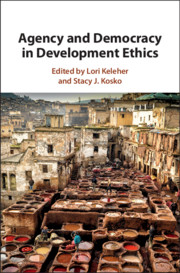Book contents
- Agency and Democracy in Development Ethics
- Agency and Democracy in Development Ethics
- Copyright page
- Dedication
- Contents
- Figures
- Tables
- Contributors
- Acknowledgments
- Introduction
- A Note from David A. Crocker
- Part I Development Ethics
- 1 Why Development Needs Philosophy
- 2 What Is Development?
- 3 Public Goods and Public Spirit
- 4 The Choice of a Moral Lens
- 5 Peacebuilding, Development, Agency and Ethics
- Part II Agency
- Part III Democracy
- Part IV Development Ethics, Agency, and Democracy
- Index
- References
1 - Why Development Needs Philosophy
from Part I - Development Ethics
Published online by Cambridge University Press: 26 February 2019
- Agency and Democracy in Development Ethics
- Agency and Democracy in Development Ethics
- Copyright page
- Dedication
- Contents
- Figures
- Tables
- Contributors
- Acknowledgments
- Introduction
- A Note from David A. Crocker
- Part I Development Ethics
- 1 Why Development Needs Philosophy
- 2 What Is Development?
- 3 Public Goods and Public Spirit
- 4 The Choice of a Moral Lens
- 5 Peacebuilding, Development, Agency and Ethics
- Part II Agency
- Part III Democracy
- Part IV Development Ethics, Agency, and Democracy
- Index
- References
- Type
- Chapter
- Information
- Agency and Democracy in Development Ethics , pp. 25 - 48Publisher: Cambridge University PressPrint publication year: 2019



